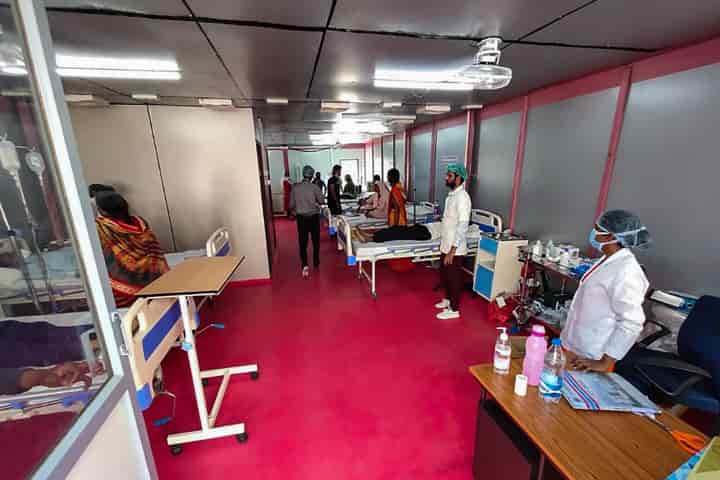Facing the second wave of the Covid-19 pandemic, there was an urgent need to ramp up healthcare capacity to take care of the increasing number of patients afflicted by the virus. Shree Ram Ravichandran, a IInd year engineering student of Indian Institute of Technology Madras, came up with the idea of collapsible and portable hospitals.
What makes these hospital extensions as they are called, very useful is that they can be transported by trucks and assembled in days at the location by offering immediate extra capacity.
Ravichandran, the 25-year-old civil engineering student had hit upon the idea of portable housing solutions, when he saw the plight of the homeless especially after the 2015 floods in Chennai. From there he graduated to fine-tuning the hospital extensions.
Faced with the need to upgrade hospital capacity, the Government has approved 50 such portable hospitals, and it is expected that soon 10 will be ready to be shipped and assembled.
In rural areas and hinterland, which have no hospitals, these portable extensions will be set up near primary health care centres.
Talking to South China Morning Post, about these portable structures, Ravichandran said: “You need to provide shelter at once in an emergency. If, when the emergency is over, these homes are not used, they are in danger of becoming non-performing assets so the key is to be able to move them easily to wherever they are needed. In India, this means being able to transport them on narrow roads and on small vehicles. That’s why we made them foldable and collapsible.”
Also read: Voluntary organisation steps in Chennai to provide mobile wards for Covid-19 patients
Ravichandran along with a classmate co-founded Modulus Housing. In 2019, they had begun selling portable homes to State Governments before expanding to small clinics, dressing rooms, labs and classrooms.
The coronavirus pandemic wave gave a new dimension to Ravichandran’s concept.
“We realised that building hospitals in areas takes far too long to be of any use in a pandemic. The need is immediate but hospitals can take years. It can take a year just to get the approvals. A prefabricated hospital that was ready to assemble and ready to use seemed a perfect solution for the pandemic,” he observed.
There are three sizes in which Modulus Housing makes hospitals. Called MediCABS, their sizes are according to the beds, that is, 20, 50 or 100 beds.

Shree Ram Ravichandran fourth from left with his team at Modulus Housing
The 20-bed hospital can be assembled in two days by four people while the 100-bed hospital takes seven days. It is not just the structure, these are equipped with medical devices, life support equipment, ICUs, bathrooms, lights and air conditioners.
“All you do once you have set it up is turn on the electricity and water supply and you are ready to take patients,” Ravichandran said.
Also read: Chennai Sisters who are playing an Angelic role by supplying food to Covid-19 patients
According to IANS news agency, Modulus Housing has started deploying MediCAB extension hospitals with the help of the American Indian Foundation (AIF). Mastercard, Texas Instruments, Zscaler, PNB Housing, Goldman Sachs, Lenovo, and NASSCOM Foundation have also extended CSR support.
The first batch of 100 bedded hospitals is being commissioned at Bilaspur (Chhattisgarh); Amravati, Pune, and Jalna (Maharashtra); Mohali (Punjab), and a 20-bed hospital at Raipur (Chhattisgarh). Bengaluru (Karnataka) will have one each of 20, 50, and 100-beds in the first phase.




















